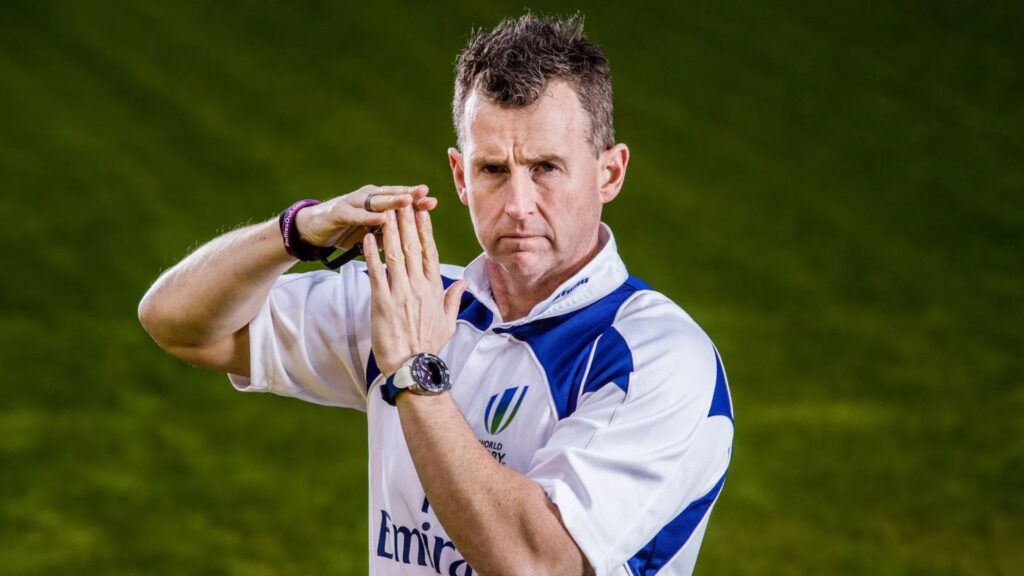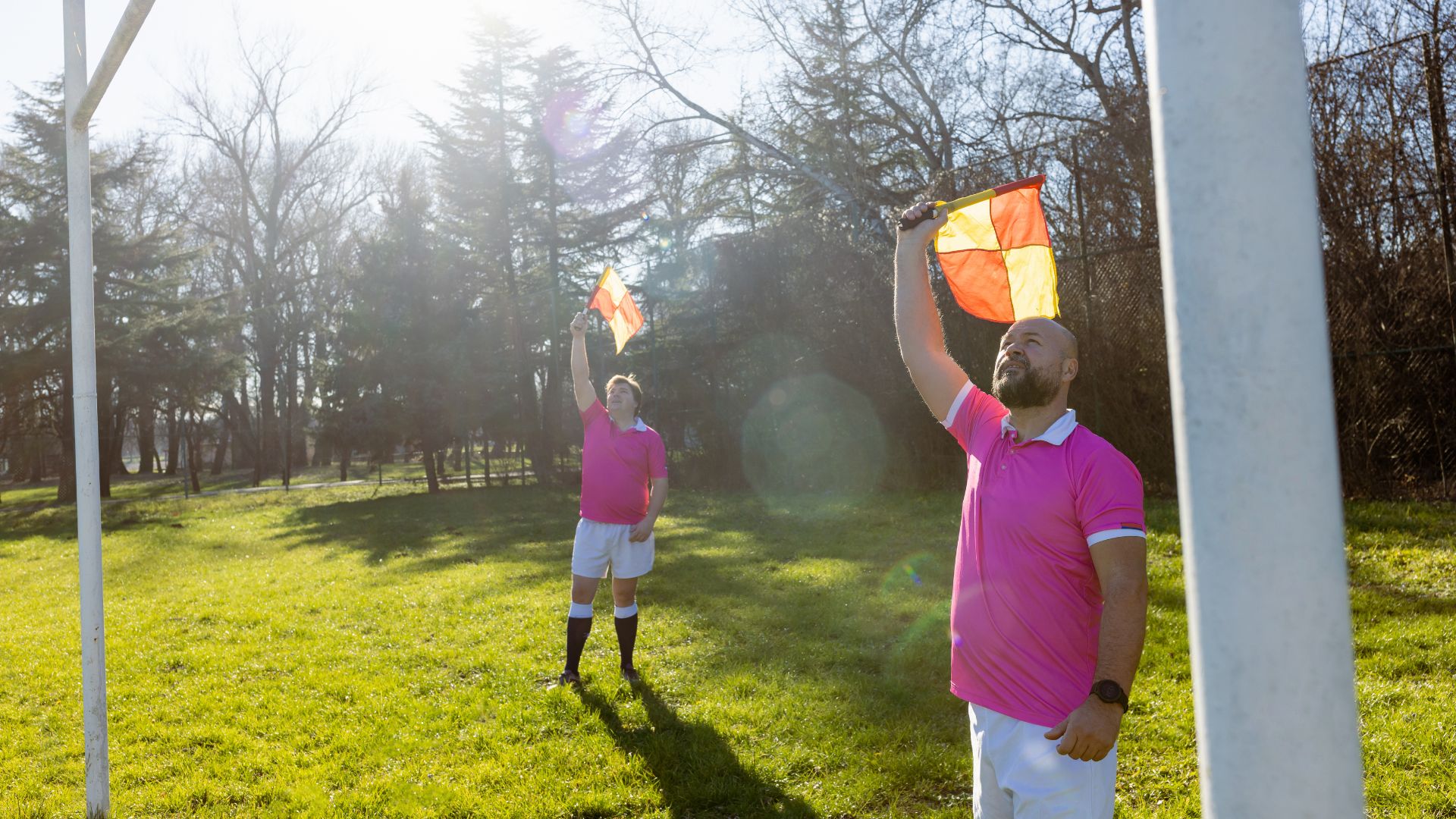Have you ever wondered what the various hand gestures and whistles during a rugby match mean? Now let’s explore the realm of rugby penalties.
In rugby, a penalty is a punishment that the referee administers for breaking a regulation. Ensuring fairness and safety of the game is fundamental.
Rugby Penalties Types
There are two types of rugby penalties: foul play and technical.
For little transgressions, technical punishments are akin to a smack on the wrist.
Foul play? That’s when things get serious. World Rugby takes player safety seriously, and so do the refs.

Common Reasons for Penalties
Offside
On the field, visualize an invisible line. You’ll be offside if you cross it too soon.
It’s similar to attempting to begin a race before the cannon is fired. Not cool, and definitely penalty-worthy.
High Tackles
Aiming for the shoulders or above? That’s a no-go.
High tackles are dangerous and can lead to more than just a penalty. Think yellow cards or even a trip to the sin bin.
Scrum Infringements
The scrum is like a choreographed dance. Miss a step, and you’re in trouble.
Collapsing the scrum or binding incorrectly? That’s a quick way to give away a penalty.
Ruck and Maul Violations
Hands in the ruck or joining from the side? The referee’s whistle won’t be far behind.
These penalties keep the game flowing and prevent unfair advantages.
Penalty Consequences
Penalty Kicks
The most common result of a penalty is a kick at goal or touch.
It’s a chance to score points or gain valuable territory. Just ask any fly-half in the Six Nations Championship.
Yellow Cards and Sin Bins
Repeat offenders or serious fouls might see yellow.
A yellow card entails ten minutes of fasting. It’s much more powerful than a grown-up timeout.
Red Cards
The greatest penalty in rugby. You’re out for the duration of the game if you receive a red card.
It’s not common, but when it does occur, it has the power to completely alter a match. Anyone who has witnessed a Rugby World Cup knockout game will attest to this.
Penalty Tries
When a try would have been scored if not for foul play, the referee can award a penalty try.
There are seven points available, no inquiries allowed. What a paradigm shifter!
The Referee’s Role in Imposing Penalties
On the pitch, the referee is the ultimate authority. Their decision is binding.
One of the most well-known referees in rugby, Nigel Owens, was renowned for his straightforward demeanor and tough approach.

Signals and Communication
Referees announce penalties with a sequence of hand gestures.
It’s similar to a code of communication that coaches, players, and supporters must all comprehend.
Advantage Rule
Sometimes, the ref might see a penalty but not blow the whistle immediately.
This is the advantage rule in action. It keeps the game flowing and can lead to some exciting play.
Penalties’ Effect on the Game
A game’s penalties can make or break it. They aim to alter the course of play rather than only punish.
The momentum of a penalty kick can change more quickly than the cheers of the Twickenham Stadium crowd.

It’s important for both players and spectators to comprehend penalties. It’s what distinguishes a true rugby enthusiast from a casual spectator.
So be aware of those penalties the next time you’re watching a game.
The Science of Penalty Kicks
In rugby, penalty kicks are an art form. It takes more than simply physical power; it also takes agility, skill, and mental toughness.
The Kicker’s Routine
If you look attentively, you can notice that every kicker has a different routine. It resembles the pre-shot routine of a golfer, only with more stakes and a full stadium in attendance.
Some move back a few feet, while others walk sideways.
Environmental Factors
Wind, rain, even the pitch itself can affect a penalty kick.
Ever seen a kicker toss grass in the air before a kick? They’re checking the wind direction. It’s like a weather forecast in miniature.
Penalties Across Different Rugby Codes
Rugby Union and Rugby League might seem similar, but their approach to penalties can differ.
Rugby Union
Penalties in Union can result in kicks at goal, scrums, or lineouts. The non-offending team has a plethora of choices at their disposal.
Rugby League
League tends to favor the ‘tap and go’ approach. It keeps the game moving at a faster pace, with fewer stoppages.
The Evolution of Rugby Penalties
Rugby’s laws aren’t set in stone. They evolve with the game.
Recent Changes
World Rugby regularly reviews and updates the laws. Recent focus has been on player safety, particularly around tackling.
High tackles are now more heavily penalized than ever before. It’s all part of making the game safer without losing its physical edge.
Popular Penalties
Long after the final whistle, certain penalties become part of rugby mythology and are hotly contested.
Well-known Events
Recall the last-second penalty that separated Australia and Scotland in the 2015 Rugby World Cup quarterfinal? It’s still discussed today.
These moments can define careers, tournaments, and even change how the game is officiated.
Technology and Penalties
The Television Match Official (TMO) has revolutionized how penalties are awarded and reviewed.
Video Replays
Referees can now see situations backward in time. It has increased the game’s accuracy to a new degree and sparked fresh discussions about technology’s place in sports.
Penalties in Training
Top teams don’t just practice their plays; they practice staying on the right side of the law.
Discipline Drills
You’ll witness drills centered on tackle technique, ruck entry, and scrum engagement if you watch a professional rugby match.
Muscle memory is the key. Players have to play by the rules instinctively when the chips are down.
The Psychology of Penalties
Penalties aren’t just physical; they’re mental too.
Mind Games
A run of violations can irritate players, which could result in more of them. Breaking this vicious cycle requires mental toughness.
Team discipline is a major focus for coaches. Remaining focused in the face of penalties is just as important as avoiding them.
Conclusion
In rugby, penalties are an integral aspect of the game, not merely a minor detail.
Gaining an understanding of them not only makes the game more enjoyable, but it also helps you appreciate the skill, strategy, and discipline that make rugby special.
Thus, keep an eye out for those penalties the next time you’re at Twickenham or watching the Six Nations from your couch. They are narrating the actual game’s plot.